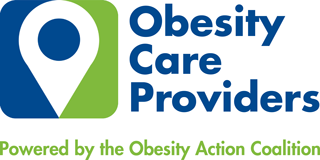What to Look for in a Healthcare Provider
 Your healthcare provider (HCP) plays an important role in your weight management journey. From helping you measure and assess your weight to guiding you with tools, resources, support and more, the partnership you develop with your HCP can make all the difference.
Your healthcare provider (HCP) plays an important role in your weight management journey. From helping you measure and assess your weight to guiding you with tools, resources, support and more, the partnership you develop with your HCP can make all the difference.
However, it can be difficult to start the conversation about weight with a healthcare provider – especially when weight is a sensitive subject. Yet, the right healthcare provider who you’ve carefully selected should help you navigate your journey in a transparent but supportive manner. You shouldn’t have to manage your weight alone, and you don’t have to.
Finding the Right Provider to Fit Your Needs
Your weight management journey is unique – and so are you! That’s why it’s important to carefully select a provider that understands and addresses your needs appropriately.
If you are struggling with obesity and/or other weight-related conditions, you deserve healthcare that is professional, respectful, comprehensive and effective. Obesity and/or issues with weight are chronic and complex, and require a multi-factor approach to treatment. The healthcare you received should be just as thorough and detail-oriented. You’ll find that with the right healthcare provider, you’re one step closer to reaching your weight management goals.
Building Your Care Team: What to Look for
 So, how do you find the right healthcare provider for you? Consider these tips when building your care team and establishing your health support system:
So, how do you find the right healthcare provider for you? Consider these tips when building your care team and establishing your health support system:
Can They Provide Useful Tools and Resources?
Consider the types of healthcare providers out there. Who might be able to assist you in your weight management journey? Examples include obesity medicine physicians, registered dietitian nutritionists, nurse practitioners, bariatric surgeons and psychologists.
Do They Use People-first Language for Obesity?
The language your healthcare provider uses matters. Words such as “fat” or “obese” label individuals with their disease/condition. Look for providers that use respectful language when discussing weight. For example: “You are affected by obesity. Let’s work together on developing a health plan that fits your needs.”
Are They Trained in Obesity Medicine?
Many providers aren’t. The right healthcare provider to help you on your weight management journey should be knowledgeable about obesity and the complexities of weight. Look for special certifications and ask about their medical background.
Are They ABOM-Certified?
ABOM stands for the American Board of Obesity Medicine. Certification as an ABOM diplomate signifies specialized knowledge in the practice of obesity medicine and distinguishes a physician as having achieved competency in obesity care.
Do They Have Accommodating Office Space and Equipment?
Details matter. Do they have seating areas that accommodate people of all sizes? What about office supplies and equipment such as gowns, scales and blood pressure cuffs? Before making an appointment, don’t be afraid to ask these questions.
Are They Knowledgeable in Different Obesity Treatments?
You will want to find a provider who talks to you about your available options. Get to know your provider before making an appointment, and ask about their experience treating overweight/obesity with different multi-factor approaches.
Is the Care They Provide Comprehensive?
Comprehensive obesity care includes biological, behavioral and psychological approaches. The healthcare provider you choose should be aware of the complexities of overweight/obesity and be willing to work with you in different ways.
Do They Accept Your Insurance?
Access to care is important. When researching healthcare providers, be sure to check their accepted insurance plans and their costs for out-of-pocket expenses.
Do They Network with Other Obesity-friendly Providers?
Your care team may include doctors, nurses, dietitians, psychologists, etc. Ask the healthcare provider you are researching if they network with other professionals who understand obesity and treat it respectfully and comprehensively.
Do They Make You Feel Comfortable?
 Your healthcare provider is a part of your health support system, and the relationship you establish with them is influential in many ways. Before seeking treatment, be sure you feel comfortable in their care.
Your healthcare provider is a part of your health support system, and the relationship you establish with them is influential in many ways. Before seeking treatment, be sure you feel comfortable in their care.
You shouldn’t have to settle when it comes to your weight and health. Finding the right healthcare provider for you and your unique needs is not only encouraged, but crucial.
If you still have questions about finding the right healthcare provider to assist you in your weight management journey, please email info@obesityaction.org.
Key Definitions:
Obesity Medicine Physician: A healthcare provider who has received specialized training to treat obesity and obesity-related conditions.
Registered Dietitian Nutritionist: A healthcare provider who is a food and nutrition expert and has met specific criteria (including education, certification and accreditation) to earn the RDN credential and treat individuals.
Nurse Practitioner: A healthcare provider who is qualified to diagnose illnesses, treat conditions and provide evidence-based health education to their patients without the direct supervision of a doctor.
Bariatric Surgeon: A healthcare provider who offers an in-depth weight-loss program centered on a bariatric surgery procedure (such as gastric bypass, gastric sleeve, gastric banding and others). These programs utilize other healthcare professionals who can help you maximize weight-loss and improve your health.
